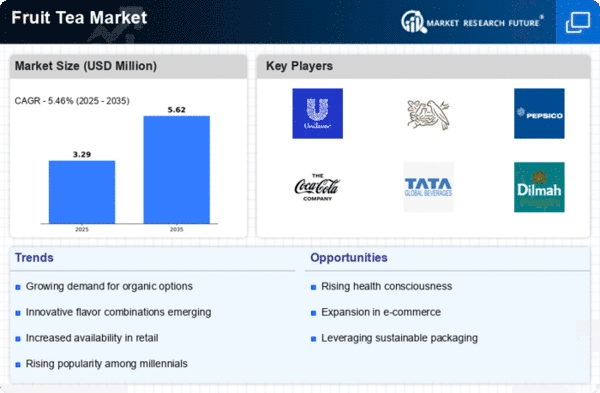Market Trends
Key Emerging Trends in the Fruit Tea Market
The Fruit Tea Market has seen notable trends and shifts, reflecting changing consumer preferences and a growing inclination towards healthier beverage options. Fruit tea, crafted from a blend of tea leaves and real fruit extracts, has gained popularity as a refreshing and flavorful alternative to traditional teas and sugary beverages. One significant trend shaping the market is the increasing demand for natural and functional beverages. As consumers become more health-conscious and seek alternatives to artificially flavored drinks, fruit tea has emerged as a favored choice due to its natural ingredients and potential health benefits. This trend aligns with the broader movement towards wellness and clean-label products, with fruit tea positioned as a refreshing and hydrating option. Anticipated to lead in rapid expansion throughout the forecast period, the identified segment is propelled by heightened health consciousness and a surging preference for natural energy sources. The segment's growth is notably driven by an increasing awareness of health benefits, prompting a shift towards natural and wholesome alternatives. Consumers, driven by a desire for well-being, are actively seeking beverages that offer nutritional advantages and contribute to their overall fitness.
Furthermore, the segment is thriving due to a growing market demand for novel and innovative flavors, particularly in the realm of fruit teas. This burgeoning interest in diverse taste experiences presents a significant opportunity for manufacturers specializing in fruit teas. As consumers increasingly seek unique and enticing flavor profiles, fruit tea producers find themselves well-positioned to cater to this evolving preference, fostering a dynamic and competitive market landscape.
The confluence of health-conscious trends and a penchant for novel taste sensations aligns perfectly with the trajectory of this segment, underscoring its potential for robust growth. Manufacturers in the fruit tea industry are poised to capitalize on these evolving consumer preferences, paving the way for a vibrant market characterized by innovation, health-centric offerings, and a diverse array of captivating flavors. Moreover, the variety of exotic and tropical flavors available in the Fruit Tea Market is contributing to its appeal. Consumers are increasingly drawn to unique and adventurous taste experiences, and fruit tea satisfies this demand with a wide array of flavor options such as hibiscus, mango, berry blends, and citrus infusions. This trend is not only diversifying the market but also encouraging innovation among manufacturers to introduce new and exciting flavor combinations that resonate with diverse consumer preferences.
The sustainability trend is also making an impact on the Fruit Tea Market. With an increasing awareness of environmental issues, consumers are showing a preference for eco-friendly and socially responsible products. This has led to a surge in demand for fruit teas that are produced using sustainable and ethical practices, including responsible sourcing of ingredients and environmentally friendly packaging. Manufacturers are responding to this trend by incorporating sustainable practices into their production processes, catering to environmentally conscious consumers seeking a guilt-free beverage option.
Furthermore, the ready-to-drink (RTD) segment within the Fruit Tea Market is witnessing significant growth. The convenience factor associated with RTD fruit teas, eliminating the need for preparation, has made them popular among busy consumers who seek on-the-go hydration without compromising on flavor. The portability and accessibility of RTD fruit teas align with the modern lifestyle, contributing to their increasing presence in the market.
Health and wellness considerations are driving the inclusion of functional ingredients in fruit teas. Ingredients like antioxidants, vitamins, and herbal infusions are being incorporated to enhance the health profile of fruit teas, tapping into the trend of functional beverages that offer more than just hydration. This positioning of fruit tea as a health-conscious choice is resonating with consumers looking for beverages that contribute positively to their well-being.
Challenges in the Fruit Tea Market include competition from other beverage categories, including traditional teas, coffee, and emerging health drinks. Additionally, variations in regional preferences and taste profiles pose challenges for standardizing fruit tea offerings globally. However, these challenges also present opportunities for market players to tailor their products to specific regional preferences and expand their consumer base.


















Leave a Comment